On May 21, top executives of Apple Inc attempted but failed to explain to a Senate committee why Congress should maintain or expand the tax loopholes that allow them to avoid U.S. taxes on billions of dollars in profits.
The Senate Homeland Security and Government Affairs Permanent Subcommittee on Investigations (PSI) issued a report on Apple’s tax practices and held a hearing to ask Apple executives and tax experts about the findings. (PSI has the power to subpoena companies to provide information that would otherwise not become public.)
A CTJ report published the day before the hearing explains how Apple’s public documents indicate that its offshore profits are in tax havens. PSI’s report and hearing have uncovered how Apple pulls this off.
Thanks to PSI’s efforts, we now know that Apple shifts U.S. profits to one of its non-taxable Irish subsidiaries through a “cost-sharing agreement” that gives the subsidiary the right to 60 percent of profits from its intellectual property, and that Apple also shifts profits from other foreign countries where it sells its product to its non-taxable Irish subsidiaries.
The Irish subsidiaries have few if any employees and don’t do much of anything, but Apple Inc has a huge incentive to claim that a lot of its profits are generated by these subsidiaries because Ireland is not taxing them. So, Apple uses the “cost-sharing agreement” to convert U.S. profits to non-taxable Irish profits for tax purposes, and likewise manipulates transfer-pricing rules and other tax provisions to turn profits from other countries into untaxed Irish profits.
Avoiding U.S. Corporate Taxes Through “Cost-Sharing Agreement”
Under the cost-sharing agreement, an Irish subsidiary that had no employees until 2012 (it now has about 250) has the rights to the majority of profits from Apple’s intellectual property, even though virtually all of that intellectual property is developed by Apple Inc (the parent company) in the United States. Since almost all of the actual manufacturing of Apple’s physical products is outsourced to other companies, this intellectual property is the real source of Apple’s profits.
It’s absurd to think of the so-called “cost-sharing” as an “agreement,” because the parties are Apple Inc and a subsidiary that it owns and controls — in other words, an agreement between Apple and itself. As the tax experts testifying at the hearing explained, there is no way that Apple would enter into such an “agreement” with an entity that it did not completely control.
Because the Irish subsidiary is controlled and managed by Apple Inc in the United States, Irish tax law treats it as a U.S. corporation not subject to Irish tax. But because the Irish subsidiary is technically incorporated in Ireland, the U.S. treats it as an Irish corporation, on which U.S. taxes are indefinitely “deferred.” Thus, neither nation taxes the profits that Apple has shifted to its Irish subsidiary.
So despite the fact that Apple does virtually all of the work responsible for its global profits in the U.S., it gets to tell the IRS that the majority of its profits are in Ireland, where they are not subject to Irish tax, while indefinitely “deferring” U.S. taxes on those profits.
Avoiding Taxes Outside the Americas by Manipulating Transfer Pricing Rules
The end of PSI’s report informs us that in 2011, Apple’s tax-planning “resulted in 84% of Apple’s non-U.S. operating income being booked in ASI,” which is one of Apple’s Irish subsidiaries. That’s because Apple also shifts potentially taxable profits from other countries into Ireland.
All the Apple products sold outside North and South America are sold by Apple subsidiaries that purchase them, apparently at inflated prices, from the Irish subsidiaries. This aggressive use of “transfer pricing” (on paper) means that Apple’s subsidiaries in these other countries reported only tiny taxable profits to their governments. That explains why Apple reports foreign effective tax rates in the single digits.
Of course, transactions between different Apple subsidiaries are all really transfers within a single company. Transfer pricing rules are supposed to make Apple and other multinational corporations conduct these paper transfers as if they were transactions between unrelated companies. But the tax authorities clearly find these complicated rules impossible to enforce.
The Bottom Line
So despite the fact that almost all of Apple’s profits ought to be taxable in the United States, most of its profits are not taxable anywhere.
Policy Solutions
Ending the rule that allows a U.S. corporation like Apple to indefinitely defer U.S. taxes on offshore profits would mean that none of Apple’s schemes to avoid taxes would be successful. We have argued before that the only way to completely end the incentives for corporations to shift profits into tax havens is to repeal deferral.
Short of full repeal of deferral, Congress could close some important tax loopholes that Apple and other multinational corporations use to make their schemes work. For example, PSI explains how Apple uses a tax regulation known as “check-the-box” to simply tell the IRS to disregard many of its offshore subsidiaries. This allows Apple to continue deferring U.S. tax on the payments made from one subsidiary to another, which circumvents a general rule that deferral is not supposed to be allowed for such “passive,” easily moved income.
One of the recommendations of the committee is to reform the “check-the-box” rules, which was also a proposal in President Obama’s first budget. (This proposal was left out of subsequent White House budgets, apparently in response to corporate lobbying).
PSI also suggests that the U.S. tax foreign corporations that are controlled and managed in the U.S. (like Apple’s Irish subsidiaries), that Congress strengthen rules governing transfer pricing, and makes several other recommendations to block the type of tax avoidance techniques used by Apple.
![]()






 At
At  “repatriation holiday,” claims that the debate over tax reform should not include a discussion of the tax avoidance practices of a corporation like Apple.
“repatriation holiday,” claims that the debate over tax reform should not include a discussion of the tax avoidance practices of a corporation like Apple.